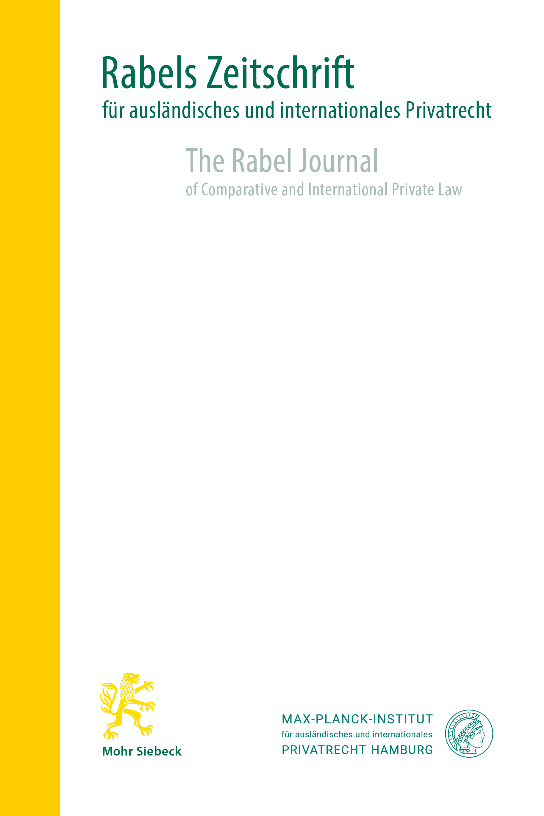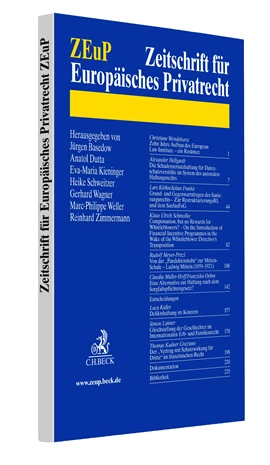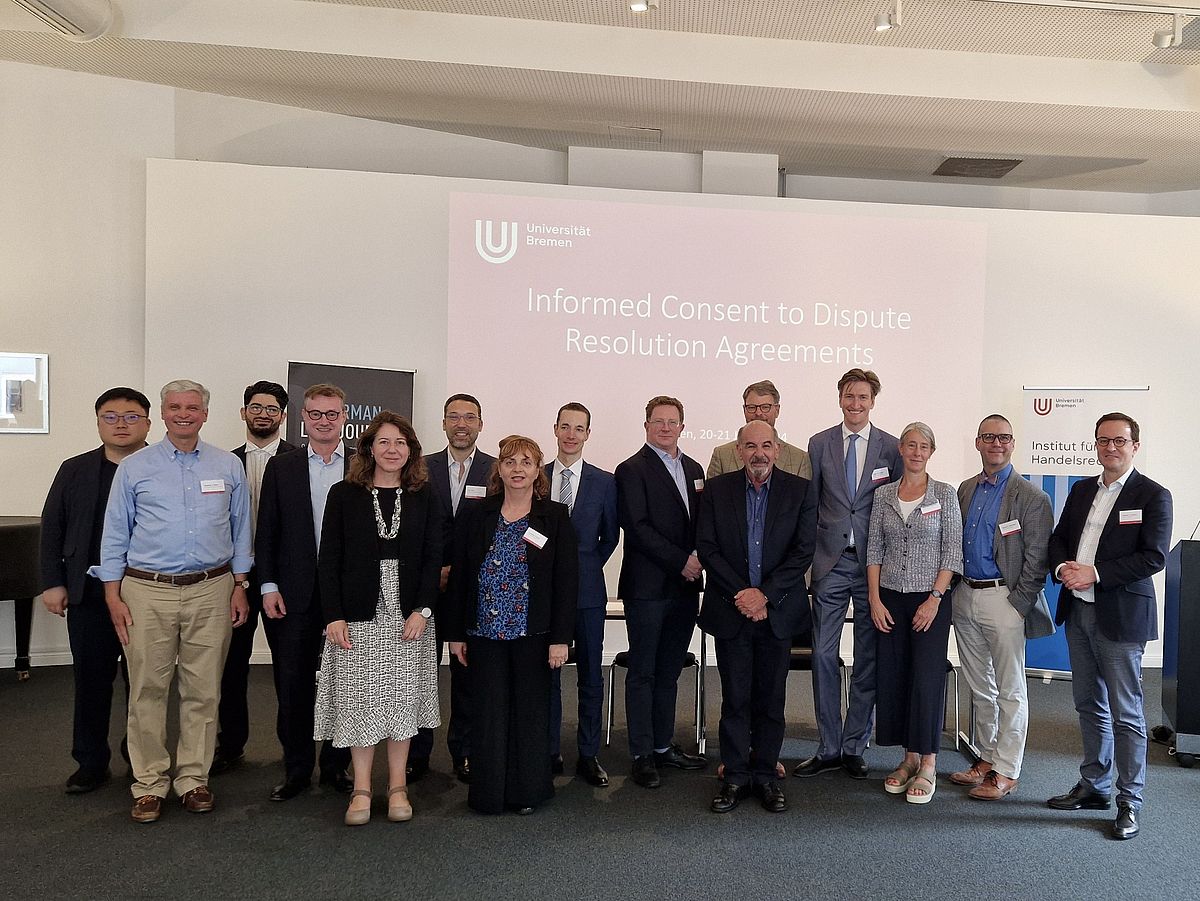Prof. Dr. Frederick Rieländer, LL.M. (Cambridge)
Professor of Private Law, Private International Law, and Comparative Law
Director at the Centre of European Law and Politics
Office hour:
by appointment

In the article, Professor Rieländer deals with the judgment of the CJEU of 4.10.2024 - C-633/22, explaining the premises of the decision that are rooted in the European system of recognition and enforcement of judgments of the Brussels I Regulation. He also emphasizes its significance for legal policy in the light of the Anti-SLAPP Directive passed last year.
The article can be found here: Rieländer, EuZW 2025, 163 – accessible via this link.

In this article, Professor Rieländer takes the Regulation (EU) 2023/2844, which plays a central role in the package of measures initiated by the EU for the digitalization of cross-border civil, commercial and criminal matters, as an opportunity to critically examine the entire European reform package.
The article can be accessed here: Rieländer, RabelsZ Online First 2/2025 – accessible via this link.
Professor Rieländer and research assistant Azizi have published an advanced exam on private international and procedural law including the UN Convention on Contracts for the International Sale of Goods. The subject of the exam is an international procedural law task with classic sales law problems under the CISG and a conflict of laws issue.
You can access the article here: Rieländer/Azizi, JURA 2025, 298 – accessible via this link.
In the article, Professor Rieländer deals with the judgment of the CJEU of 11.7.2024 - C-757/22 on the EU law requirements for the right of an association to institute legal action in the event of data protection breaches. The article is available here: Rieländer, RDi 2025, 42 - accessible via this link.
Professor Rieländer already commented on this in July 2024 on beck-aktuell. The statement is accessible via this link.

From 21-22 November 2024, the Universities of Groningen and Bremen hosted an international conference on ‘Good and bad practices in European Housing Law and Policy’.
Scientists from 16 European countries and South Korea were represented. The conference analysed legal and political structures that have the potential to alleviate the housing crisis that currently prevails in almost all European countries, namely in the areas of human rights, urban development, spatial planning, housing market regulation, social and publicly subsidised housing, ownership and renting and alternative forms of housing. The contributions will be published in a joint volume in the Land and Housing Law and Policy Series with Elgar Publishing, London.

In this article, Professor Rieländer examines the judgment of the CJEU of 6.6.2024 - C-381/23 in the light of previous CJEU case law on the predecessor standard of Art. 21 Brussels Convention on jurisdiction and the enforcement of judgments in civil and commercial matters. In addition, he discusses the conflict of laws implications of the judgment and highlights the consequences for practice.
The complete article is available here: Rieländer, NZFam 2024, 1116 – accessible via this link.
In a further article, Professor Rieländer deals with the judgment of the CJEU of 4.10.2024 - C-4/23. He notes that with this decision, the CJEU dispels all doubts that the “recognition principle” contoured on the basis of the naming law also applies to gender affiliation.
The article can be accessed here: Rieländer, NZFam 2025, 46 – accessible via this link.

In this article, Professor Rieländer addresses the ownership of digital assets. He discusses the legal nature of crypto-token and the possibilities of “tokenising” real or virtual assets from a comparative law perspective. In addition, he explores options for reforming German private law in light of the international legal developments.
You can access the article here: Rieländer, ZEuP 2024, 769 – accessible via this link.

Professor Rieländer takes the decision of the Higher Regional Court of Düsseldorf in its case 26 W 7/24 as an opportunity to deal with the dogmatic foundations of the presumptive jurisdiction of German courts to order countermeasures against anti-suit injunctions. He also examines whether international arbitration agreements could be enforced by issuing anti-suit injunctions.
You can access the article here: Rieländer, JZ 2024, 1024 – accessible via this link.
Professor Rieländer and research assistant Aydin are publishing a beginners' exam in tenancy law in the November issue of JuS. The moderately difficult exam deals with problems from tenancy law with a focus on the examination of tenancy law warranty rights and extraordinary termination without notice.
You can access the article here: Rieländer/Aydin, JuS 2024, 1036 – accessible via this link.
On June 20 and 21, 2024, the Institute of Commercial Law at the University of Bremen hosted an international conference on "Informed Consent to Dispute Resolution Agreements." Professor Rieländer spoke in Panel II on the topic "Unfair Contract Terms Directive (93/13/EEC) and US Restatement of Consumer Contracts compared," highlighting the differences in the jurisdictional approaches between the EU and the USA. The contribution will be published in a special issue of the German Law Journal (Vol. 26, 2025).
Further information about the conference can be found here.
In this article, Professor Rieländer critically assesses the decision of the CJEU in its case C-81/23, in which the CJEU decided on the jurisdiction based on the place where the harmful event occurred under Art. 7 No. 2 of the Regulation (EU) No 1215/2012. He also outlines the conflict-of-law implications of the judgment and its consequences for legal practice.
The complete article is available here: Rieländer, EuZW 2024, 461 – accessible via this link.
In this article, Professor Rieländer addresses the reference for a preliminary ruling by the German Federal Court of Justice (Bundesgerichtshof) in its case XII ZB 117/23 which for the first time enables the CJEU to express its opinion on the scope and significance of the term "habitual residence" under the Rome III Regulation. Professor Rieländer also examines the necessity of a different interpretation of the connecting factors of the Brussels IIb Regulation and those of the Rome III Regulation.
You can access the article here: Rieländer, NZFam 2024, 440 – accessible via this link.

In this article, Professor Rieländer discusses the EU framework of private international law for cross-border disputes concerning credit ratings. He debates the possibilities for reforming the existing private international law regime to enhance investors’ access to justice in disputes with credit rating agencies.
The article can be accessed via this link.
At the UNIVERSITY OF BREMEN, in the Department of Law, starting on 01.10.2024, a position is available in the research team of Professor Frederick Rieländer, LL.M. (Cambridge) as a
Research Assistant (m/f/d)
(pay grade 13 TV-L, 19.6 hours per week)
for a duration of 3 years.
Further information can be found here.
On June 20 and 21, 2024, the Institute of Commercial Law at the University of Bremen will host an international conference on "Informed Consent to Dispute Resolution Agreements" in Bremen. Professor Rieländer will give a presentation on the topic "Unfair Contract Terms Directive (93/13/EEC) and US Restatement of Consumer Contracts compared" in Session 2: Standard form contracts and unfair terms. A special issue on the conference will be published in the German Law Journal (GLJ).
Further information about the conference can be found here.
Prof. Rieländer has previously published numerous works on standard terms and consumer law. Two of his recent publications can be found here: Rieländer, EuZW 2023, 317 – accessible via this link, and Rieländer, EuZW 2023, 277 (comment by Prof. Rieländer at p. 282) – accessible via this link.
In this article, Professor Rieländer discusses the decision of the CJEU in its case C-821/21 on international jurisdiction in consumer matters, highlighting the significance of the Court’s ruling. The judgment clarifies that the Brussels Ia Regulation does not provide for joint jurisdiction in consumer matters and furthermore limits consumer protection under the Rome I Regulation.
You can find the complete article here: Rieländer, NJW 2024, 569 – accessible via this link.
Professor Rieländer critically analyzes the decision of the Federal Constitutional Court (Bundesverfassungsgericht) of 5 September 2023 – 1 BvR 1691/22 and discusses the competences of German courts regarding the refusal of the enforcement of foreign child return decisions.
The full article can be accessedhere: Rieländer, NZFam 2024, 203 – accessible via this link.
Based on the decision of the CJEU in its case C-821/21, Professpr. Rieländer addresses the limits of consumer protection in European private international law.
The article can be accessed here: : Rieländer, RIW 2024, 1 – accessible via this link.
In this article, Prof. Rieländer discusses the case-law on the law applicable to an action for indemnity between the insurers of a tractor unit coupled with a trailer arising as a result of a road traffic accident that occurred in a Member State other than the one where the vehicles are registered.
The article can be accessed here: Rieländer, IPRax 2024, 200 – accessible via this link.
The two-part article by Professor Rieländer outlines the case law of German courts, the CJEU, and the ECtHR on international family law from January 2021 to December 2022.
Part I of the article can be found here: Rieländer, NZFam 2023, 1057 – accessible via this link. Part II can be found here: Rieländer, NZFam 2023, 1112 – accessible via this link.
The overview of the case law on international family law will be published annually in the future. We will keep you informed about the latest articles here.
In this article, Professor Rieländer discusses a new CJEU decision concerning “quasi anti-suit injunctions” under the (old) Brussels I Regulation. He also addresses the question of the criteria for the admissibility of liability for damages due to the disregard of jurisdiction agreements within the scope of the (new) Brussels Ia Regulation following the CJEU's decision.
The article can be found here: Rieländer, JZ 2023, 902 – accessible via this link.
Professor Frederick Rieländer accepted the offer for the chair for private law, private international law and comparative law at the University of Bremen in May 2023. He became full professor of law in July 2023 and has been the Director of the Centre of European Law and Politics (ZERP) since October 2023.
Scientific and professional career
since October 1, 2023
Director of the Centre of European Law and Politics (ZERP) at the University of Bremen
since July 1, 2023
Professor of Law (Full), Chair of Private Law, Private International Law and Comparative Law, Faculty of Law, University of Bremen
April 2020 to July 2023
Acting Professor at the Universities of Gießen, Münster, Bremen, Mainz and Frankfurt (Oder)
May 6, 2020
Habilitation at the University of Osnabrück; Venia Legendi for Private Law, Commercial Law, Private International Law, European Private Law, Civil Procedural Law and Comparative Law
September 2018 to July 2019
LL.M. studies at the University of Cambridge
2015–2020
Lecturer of law and legal researcher in the team of Professor em. Dr. Dr. h.c. mult. Christian von Bar, FBA, MAE at the European Legal Studies Institute of the University of Osnabrück
March 12, 2015
Second State Exam in Law (Grade: Excellent)
2013–2015
Legal clerkship at the Higher Regional Court Oldenburg
November 14, 2013
Doctor of Law (LL.D.) at the University of Osnabrück (Grade: summa cum laude)
2011–2013
Lecturer of law and legal researcher in the team of Professor em. Dr. Dr. h.c. mult. Christian von Bar, FBA, MAE at the European Legal Studies Institute of the University of Osnabrück
July 12, 2011
First State Exam in Law (Grade: Excellent)
2005–2011
Studies of Law (course: First State Exam in Law/Diploma in Law) with additional training in economics at the University of Bremen
Research areas
- German and European Private Law
- Private International Law
- Comparative Law
- German, European and International Civil Procedural Law
Awards, scholarships and memberships
- Special award for First State Exam in Law by the Ministry of Justice, Lower Saxony (Rank 1/2011)
- Special award for First State Exam in Law by the Schindhelm Rechtsanwaltsgesellschaft mbH: First Prize for works on commercial law and tax law 2011
- Special award for First State Exam in Law by the Ministry of Justice, Lower Saxony (Rank 2/2015)
- Acceptance of a Doctoral Scholarship by the German National Academic Foundation 2012 (rejected) Studienstiftung des deutschen Volkes 2012 (rejected)
- Cambridge Trust Scholarship at the University of Cambridge 2018/2019
- Acceptance of a Jeremy-Bentham Scholarship by the University College London 2018/2019 (rejected)
- Special reporter in the research project “Liability of Credit Rating Agencies” of the Internationael Academy of Comparative Law (IACL) 2022/2023
- Member of the “Working Group on the Law Applicable to Digital Assets” of the European Association of Private International Law (EAPIL) since 2023
- Member of the Consultative Committee in the research project “Succession of Digital Assets, Data and other Digital Remains” at the European Law Institute (ELI) since 2024
- Other fellowships and memberships: European Law Institute, Wissenschaftliche Vereinigung für Internationales Verfahrensrecht, Gesellschaft für Rechtsvergleichung, Zivilrechtslehrervereinigung, Vereinigung der Zivilprozessrechtslehrer, European Association of Private International Law (EAPIL), Deutscher Hochschulverband, Corpus Christi College (University of Cambridge)
Functions in academic self-administation
- Chairman of the Examination Board, Faculty of Law, University of Bremen
- Member of the Faculty Council, Faculty of Law, University of Bremen
- Deputy Member of the Ethics Committee, University of Bremen
- Member of the Examination Board at the Examination Office of the Higher Regional Court Bremen
- Deputy Member of the appointment committee to fill the professoship of Public Law at the Faculty of Law, University of Bremen 2023/2024
- Deputy Chairman of the Examination Board LL.B. Business Law at the Faculty of Law, University of Osnabrück 2016 to 2020
- Coordinator of the University preparation course for the first state exam in law, Faculty of Law, University of Osnabrück 2015 to 2016
Expert activities and consultancy work
- Reviewer for research projects at the Fritz Thyssen Stiftung
- Reviewer for doctoral scholarships at the German National Academic Foundation
My complete list of publications is available for DOWNLOAD here,
My ORCID ID is accessible via the following link: https://orcid.org/0000-0002-8280-9166
Secretary:
Kerstin True-Biletski
Raum A2070
Phone: +49 (0)421 218-66044
Fax: +49 (0)421 218-66052
E-Mail: ktrueprotect me ?!uni-bremenprotect me ?!.de
Research assistants:
Ilayda Aydin
Hassina Azizi
Student research assistants:
Edita Preniq
University of Bremen
Faculty of Law
Universitätsallee, GW1, Room A2150
28359 Bremen
Phone: +49 (0)421 218-66116
E-Mail: frielaenprotect me ?!uni-bremenprotect me ?!.de
Secretary:
Kerstin True-Biletski
GW1, Room A2070
Phone: +49 (0)421 218-66044
Fax: +49 (0)421 218-66052
E-Mail: ktrueprotect me ?!uni-bremenprotect me ?!.de


